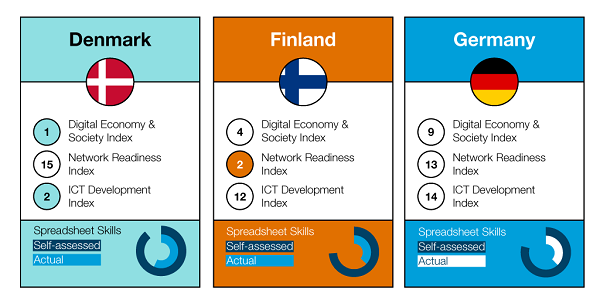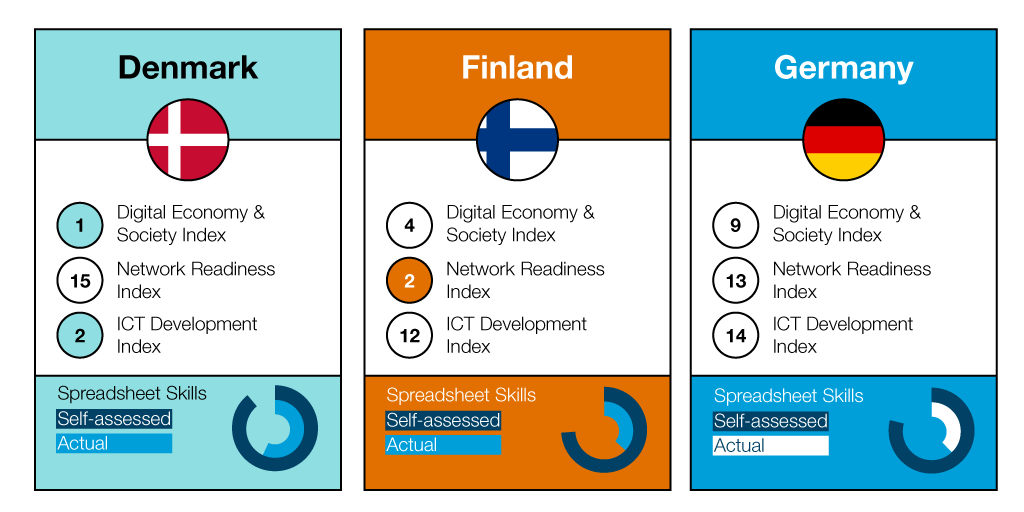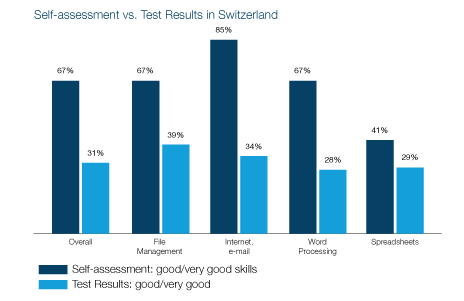Perception and Reality: Measuring digital skills

If I asked you to rate your skills with word processing software on a scale of 1 to 10, then it is pretty likely that you would rate your skills quite highly, maybe an 8 or a 9. But what is that score based on? Does it mean that you know how to do a mail merge, or that you can edit and apply text styles? That’s the problem with self-assessment: everyone measures differently. Add in the tendency for people to overestimate their abilities, and you have the ingredients for a lot of confusion about what people can really do with technology!
To find out how big a problem this really is, ECDL Foundation has released a report examining the results of recent studies of digital literacy, conducted in five European countries by ECDL Foundation’s Partners.
The key finding is quite simple: people are bad at assessing their own skills. The studies, which were conducted in Austria, Denmark, Finland, Germany and Switzerland, found that people consistently overestimate their digital skills. For example, in Austria, 94% of respondents described their digital skill levels as “average” to “very good”. When their actual skills were tested, only 39% managed to achieve a corresponding test result. The research also highlighted the fact that significant digital skills gaps exist in all of the surveyed countries. Even countries that scored very highly on international indexes—people showed gaps in their knowledge and ICT abilities that could hold them back from performing at their best.
It has been said many times, but it bears repeating: digital skills are vital. Almost all jobs, increasingly today and certainly in the future, will require digital skills. That means that all workers need to have, or acquire, those skills. A digitally literate workforce is important for society, as it enables individuals to progress in their careers and achieve more, but it is also important for employers. Digitally literate employees enable organisations to make the most of modern technologies, and help them to compete. In turn, this can help boost countries’ economies. It is clearly in everyone’s interest to make sure that workers have the digital skills that they need to work effectively and efficiently. Indeed, the importance of digital productivity skills makes it all the more worrying that people are bad at estimating their own skills. Without an acceptance of the need to build skills and extend knowledge, what is the motivation to go and do just that?
It is easy to see the problem of low levels of digital skills as something abstract, but, as we’ve written here previously, poor digital literacy costs a lot! One study in The Netherlands found that digital ignorance could be costing the Dutch economy 21,6 USD billion a year in lost time, while another study in Singapore estimated that workers spent, on average, 151 minutes a week dealing with difficulties using software on their computers, costing over 1.738 USD per employee every year.

Two of the studies that are featured in our new paper, were conducted in Denmark and Finland: countries that sit high in international rankings for quality of their education systems, digital competitiveness, and skills to take advantage of the possibilities offered by a digital society. Despite this, and despite doing well in some areas, the students who took part in the studies performed poorly in several key areas of workplace digital skills. Students in Denmark showed a high degree of confidence in their abilities with spreadsheets (89% felt “very” or “quite” confident), but just 57% answered practical questions correctly. In Finland, it was a similar story with presentation software (87% felt “very” or “quite” confident, but only 60% answered the practical questions correctly).
One thing that the studies reinforce is the problem of believing the fallacy of ‘digital natives’: young people who are assumed to be proficient with digital technologies just through exposure to them. It is clear to see in the results that lots of time using social media is not resulting in young people having the necessary skills for the workplace. There are big gaps in skills around word processing, spreadsheets and presentations, but there are also surprising, and concerning, gaps in skills for online collaboration and using the web. In Finland, Germany and Switzerland, there were pronounced differences between participants’ self-assessment (usually high) and their actual performance. A key driver of the increase in use of ICT in the workplace is the opportunity that the internet offers for collaboration and more effective working. If young people aren’t equipped with the skills to work online, let alone use ‘traditional’ office software, then the mismatch between the skills needed in the workforce and the skills present in the workforce will only widen.

Germany and Switzerland, also countries that rank highly for a range of international indicators for digital competitiveness and skills, revealed confidence levels similar to those found by the Danish and Finnish studies. 79% of German students were “very” or “quite” confident in their abilities with spreadsheets, while only 38% managed to answer the test questions correctly. In Switzerland, 85% of participants assessed their skills as “good” or “very good” in using the internet and email, yet only 34% performed at that level in a practical test. A particularly interesting finding of the study in Switzerland was that holders of ECDL / ICDL certificates performed significantly better in the practical tests, suggesting that a structured training course with certification is one way to ensure that people have the digital skills that they need.
It is clear that we have a problem. People don’t have the skills that they need for the workplace, and they are often bad at realising that. What’s more, young people without proper digital skills training are at risk of being left behind by technology that is advancing faster than their abilities. Thankfully there are solutions to this problem. Making sure that everyone has access to structured, well thought out training programmes, backed by certification such as ECDL / ICDL, to prove that people have truly gained the computer skills they need, can help close the skills gap that we are already faced with.




